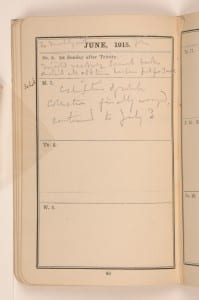100 Years of the Petrie Museum
By Debbie J Challis, on 9 June 2015

Flinders Petrie’s ‘Pocket Diary’ entry for 7 June 1915. Petrie Museum of Egyptian Archaeology Archives.
On 7 June 1915 the Petrie Museum of Egyptian Archaeology opened its doors at UCL for the first time. On the day Petrie wrote in his pocket diary ‘exhibitions of whole collection finally arranged’. There was plenty else going on in the world, not least in London and Egypt.
Only a week before the first Zeppelin bombing raid had hit London hard, the Gallipoli campaign was raging in the Dardanelles in Turkey and soldiers from across the British Empire were training for that campaign under the shadow of the Pyramids in Giza. Petrie had tried to join up as a soldier on the outbreak of World War One in 1914, but he was turned away as he was considered too old to fight – he was 61. Cut off from Egypt and the Middle East, Petrie concentrated on the collections he had gathered from excavations, dealers and donations for the last three decades at University College London.
The collection of antiquities was well known among budding archaeologists and those interested in Egyptology. Arthur Weigall, later an Inspector of Antiquities in Egypt, described going to find Petrie surrounded by his objects in 1901:
He was on his hands and knees, and was just crawling stealthily away towards a dark corner wherein some sacking and other packing materials were heaped. I stood quite still; and to my surprise, I saw him reach out his arm for a piece of the sacking, and attempt to toss it over his hindquarters, just as an elephant throws dust or straw over its back with its trunk.
Petrie, having heard Weigall come in, was apparently hiding from him as he avoided seeing visitors.
The museum still appears to hide from visitors, tucked as it is down a back street at the side of UCL Campus, but we try to make our collection accessible to researchers and public alike. Last week our centenary book The Petrie Museum of Egyptian Archaeology: Characters and Collections was published by UCL Press, the newly founded and Open Access publisher based here at UCL. The book is free to download as an e-book and enhanced content – including video, sound and high resolution photographs – is available for all online.
The accompanying exhibition ‘Characters and Collections’ opens on 1st July. Both the exhibition and book focus on the stories behind the Petrie Museum’s unique collections and the extraordinary characters whose lives are caught up in the museum’s rich and varied history. The characters highlighted include the adventurous Flinders Petrie, from whom the museum takes its name and who was once described by Lawrence of Arabia as ‘enormous fun’; Margaret Murray, an Egyptology lecturer at UCL and a significant influence on the development of Wicca; and Ali Suefi, Flinders Petrie’s Egyptian right-hand man and discoverer of many of the museum’s most prized objects.
Despite being ‘enormous fun’ in 1879 Flinders Petrie wrote that:
I abhor all ceremonies and festivities. . . I would rather do a week’s hard work than assist in a day’s pleasure.
The founding archaeologist of the Petrie Museum may have had a hardline stance on parties and entertainment, but today we do not. We think there is much to celebrate this week and so we have a celebration on Thursday (free – only a few spaces left!) where you can meet some of these characters in among our collection. A full programme of centenary related events is on our website too. To see what is going on and find out weird facts follow #Petrie100 on instagram and twitter!
 Close
Close


